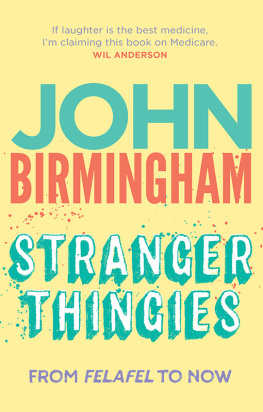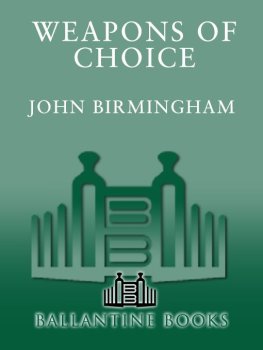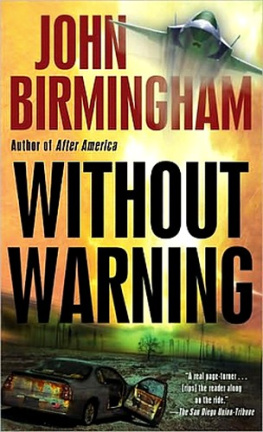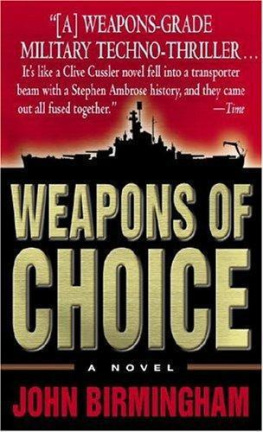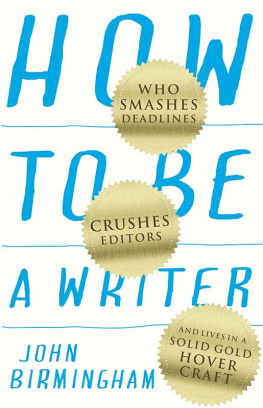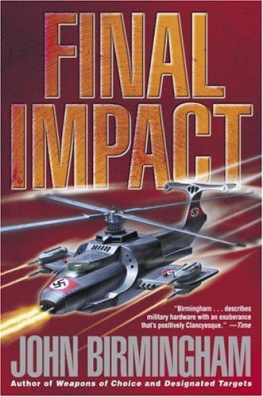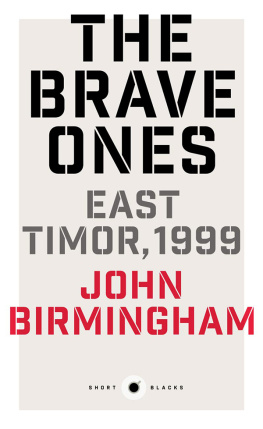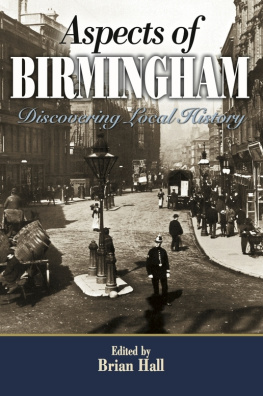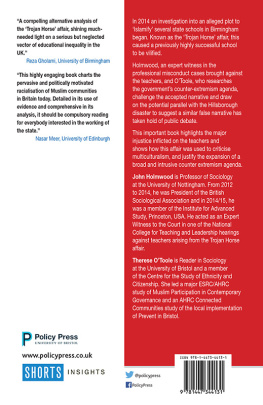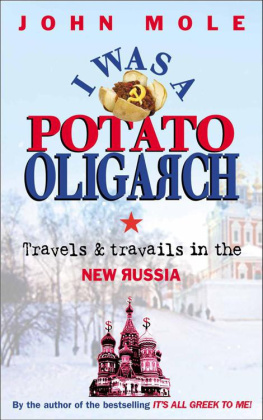STRANGER THINGIES
JOHN BIRMINGHAM is a journalist, columnist, blogger, prolific tweeter and author of two Quarterly Essays, a number of books of fiction, non-fiction and memoir. These include He Died with a Felafel in His Hand, The Tasmanian Babes Fiasco, the Axis of Time series of thrillers, the Disappearance series and the Dave Hooper novels. He won the National Award for Non-Fiction with Leviathan: The Unauthorised Biography of Sydney. How To Be a Writer: Who Smashes Deadlines, Crushes Editors and Lives in a Solid Gold Hovercraft was published in 2016. He currently writes regular columns for Fairfax Media.

A NewSouth book
Published by
NewSouth Publishing
University of New South Wales Press Ltd
University of New South Wales
Sydney NSW 2052
AUSTRALIA
newsouthpublishing.com
John Birmingham 2017
First published 2017
This book is copyright. Apart from any fair dealing for the purpose of private study, research, criticism or review, as permitted under the Copyright Act, no part of this book may be reproduced by any process without written permission. Inquiries should be addressed to the publisher.
National Library of Australia
Cataloguing-in-Publication entry
Creator: Birmingham, John, 1964- author.
Title: Stranger Thingies / John Birmingham.
ISBN: 9781742235592 (paperback)
9781742244013 (ebook)
9781742248394 (epdf)
Subjects: Birmingham, John, 1964
Australian literature--Collections.
Authors--Australia--Miscellanea.
Authors, Australian.
Design Josephine Pajor-Markus
Cover design Luke Causby, Blue Cork
All reasonable efforts were taken to obtain permission to use copyright material reproduced in this book, but in some cases copyright could not be traced. The author welcomes information in this regard.

CONTENTS
Introduction
Stephen King once made the point that horror and humour are two of the most difficult writing forms. Done poorly, horror turns unintentionally funny. And bad humour is just creepy.
As I write these words decades after I first put pen to paper actual ink to actual paper I find myself recalling that when I started writing, I wanted to be Stephen King. To write horror stories.
So yeah. That didnt work out too well.
You can see my first attempt in the State Library of New South Wales. I donated a handwritten manuscript of terrible quality, based on second-hand ideas stolen directly from the early works of the King. Its inspirational. Reading it, a young author could not help but think, Sweet baby cheeses, this loser is even worse than I thought. If he can get published, Ill probably be able to buy JK Rowlings Scottish castle with my royalties.
And maybe you will. Best of luck to you, kid.
I gave up on horror writing, although I did circle back around a ways with the Dave Hooper series. Those books, about a massive douchebag accidentally embiggened into a superhero, have all the trappings of horror novels: vampires, zombies, deplorable red-necks with no sense of irony. But theyre played for lulz. These, it turns out, are easier than scares. At least for me.
Its telling, I think, that I grubbed around as a starving freelancer for ten years before Michael Duffy published He Died with a Felafel in His Hand. I was a very successful freelancer, which meant I was making about twelve grand a year and eating a lot of two- dollar meals at the Hare Krishna cafe in Kings Cross. The sultana pudding was nice, fuck you very much.
But after Felafel, I never ate there again. Not even for the pudding. I could afford to buy real pudding at grown-up restaurants where they wont even let you in the front door if youre not wearing big-boy pants and shoes.
What changed?
It wasnt just the enormous royalty cheques Michael signed every six months.
It was the lulz.
After Felafel, editors paid me for the lulz, not for the stories. Because as the King pointed out, horror and humour are damned hard work. Not once a day, in a tweet or something. Anybody can do that. But when you have to crank thousands of words a week, every week, or you end up living under a bridge and dreaming of the days when you could afford two- dollar cult pudding for lunch, then being funny is hard and sometimes hateful work.
You can spend hours working on a single joke and I will put money on the barrelhead that within an hour or so of it being released into the world some buzz- killing shithead will front you to tell you it wasnt funny. (Trust me, kid. It was funny. The buzzkillers got deeper issues hes working through.) Sometimes youll toss off some half-baked idea leading up to the real pay-off and its the asinine, undeveloped joke that gets all the ROFLs.
Dont sweat that, either. Making people laugh, or smile, or just quietly taking them out of whatever shitty day theyre having, thats good honest work. You probably wont be remembered for it, but that doesnt matter. When you check out youll have done more good in the world than harm. Be content with that.
The pieces collected here span over 20 years of writing. They make their way in from the fringe press, where I started out writing for food vouchers, and they include some of the most recent work Ive done in a private column, written only for paying subscribers.
Thats how this business has gone. Originally, if you had a knack for making people smile and occasionally laugh you could aspire to a weekly column somewhere, the closest thing to regular work a grinning bullshitter can hope for outside of telemarketing or politics. That sort of gig is getting to be rare, though. I have one with Fairfax, at Brisbane Times, which Ive been doing for ten years and still enjoy. But one by one, the magazines and newspapers which used to be the natural home of the pro satirist have died or gone digital. They can only pay in exposure.
Still, Im cranking out many more jokes per week than I ever have, and the repo men havent come for me yet. Long after Im gone I feel pretty confident plenty of others will be making the rent in the same racket.
The thing which has really changed isnt the business model of the mainstream media (Google ate that years ago). Its the connection to your readers, to the people youre trying to amuse. It used to be that the only way you knew a joke had landed like, really knew was when you were lucky enough to see somebody reading your stuff in public and laughing.
Thats some powerful juju, right there faintly, distantly akin to the magic a stand-up comedian taps into when theyre in front of a full house and riding the laughs like a surf break at Mavericks. I dont know how stand-ups do it, but I can understand why it would be so addictive, and so utterly destructive too. Theyre mainlining a drug that writers of humour, alone at their keyboards and disconnected from immediate feedback, can taste only in severely diluted form, at least until recently. Somebody once told me that a small piece Id written called Consider the bucket bong for a now defunct mag was the funniest thing theyd ever read, but they told me months after it came out. That piece became the inspiration for Felafel, and as well as that book did, it was still months before I had any direct experience of its success.
These days, people come at you within seconds to let you know what they thought. My particular heroin is to hear, usually on Twitter, that somebody snorted coffee through their nose when reading my morning column.
Next page
